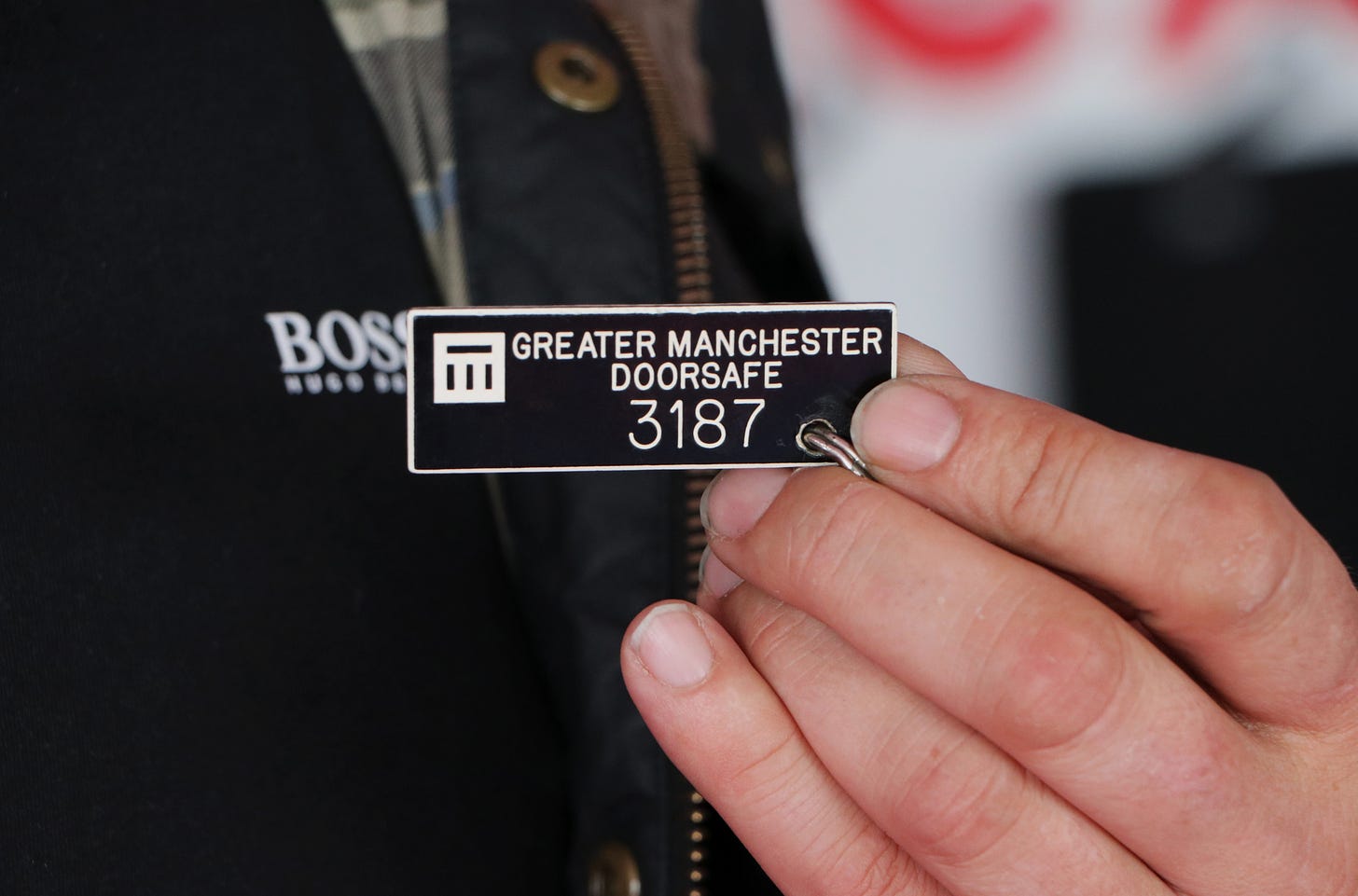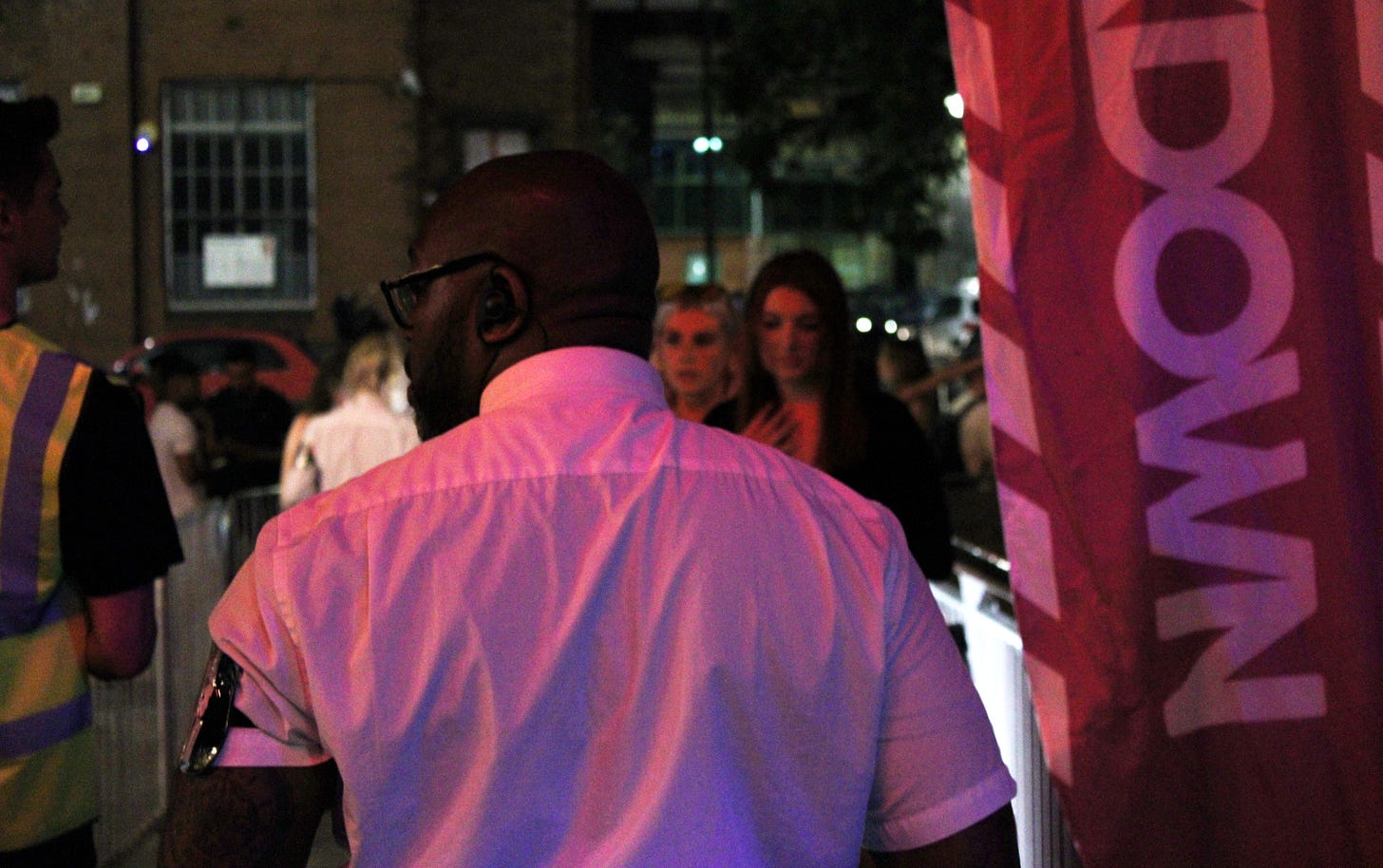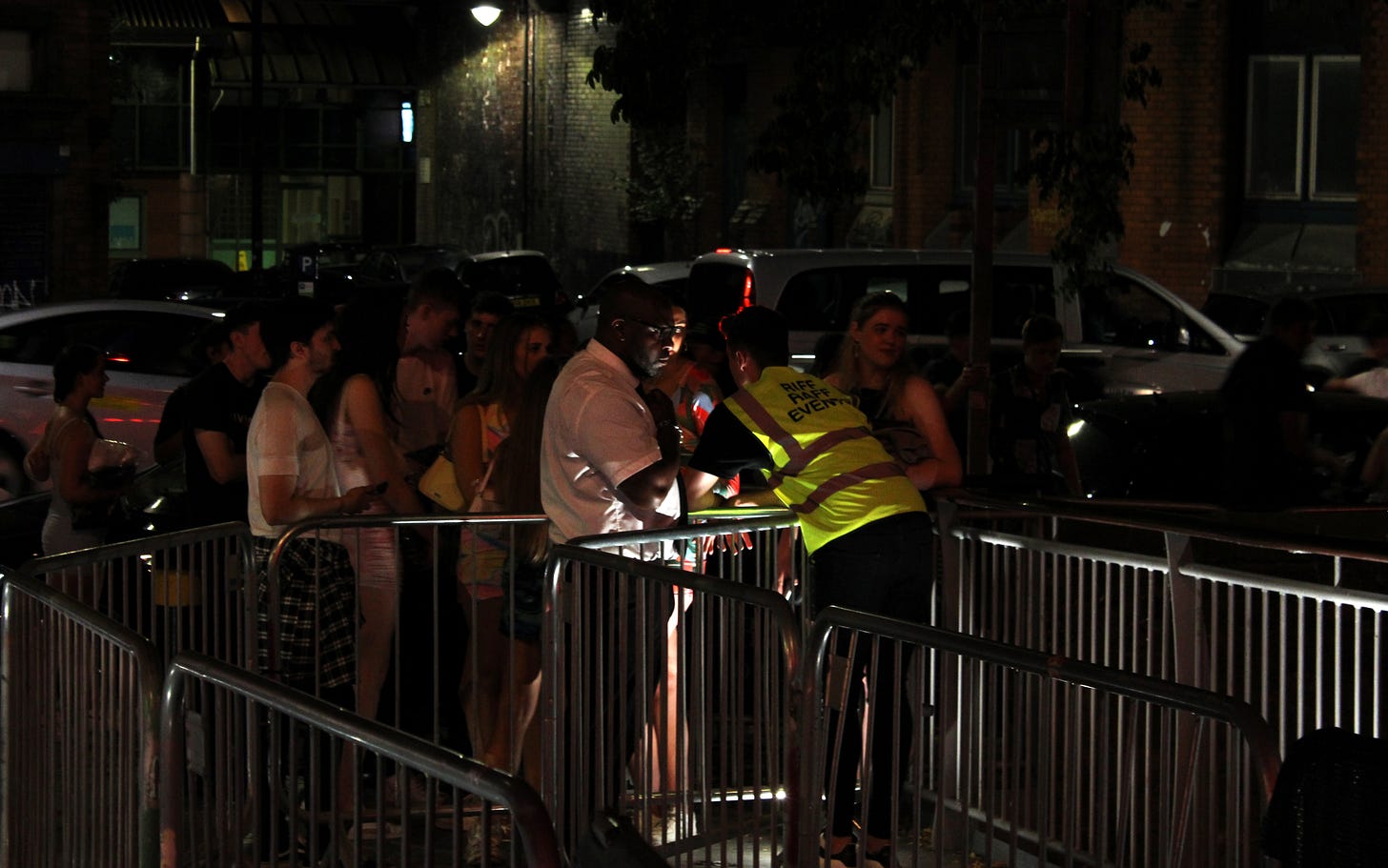Life on the door
On the night that clubbing returns to Manchester, we join the security staff at a city centre venue and hear about an industry in peril
“Right. We’ve all done a student night; we’ve all hated it,” says Kelvin Ellis. “If they get too pissed, get them out. If we can give them a bottle of water and 20 minutes: do that. No need to be too heavy-handed.” The loose knot of doormen around him nod in agreement and return to their posts.
It’s about 9pm, and the sky above Deansgate locks is caught on the seam that connects day and night. A milky blue bowl, threaded with a few slender clouds stained blister pink, the sun resting on the horizon at the end of Whitworth Street West like an upturned pot of honey. For Manchester’s night-time industry and its operators, this setting sun signifies a new dawn.
A short queue, no more than fifteen people, has already built up before I arrive. Staff on the Locks make last-minute preparations for their reopening — which is a ticketed, dual-club event shared between Revolution and Ark, the Locks’ two largest nightclubs.
Door staff and some bar managers clip together barriers, discuss where customers will enter and exit, tick off note pads and sip various energy drinks. One or two have, somehow, managed to procure Tango Ice Blasts. Over the Rochdale canal, which lies between Whitworth Street and the locks, three girls at the front of the queue attempt to get some sort of synchronised clap going. It doesn’t last.
The event is set to start at 9:45pm. At around 9:20pm a manager clips a few more barriers together, takes a step back and looks at them meaningfully, like someone looking at finished flat-pack furniture. They’re ready. For a few moments, there’s an eye-of-the-hurricane eeriness as we wait for the night to begin.
We hear the thuds of taxi doors shutting, then the indecipherable odds and ends of conversations followed by the frenzied metronome of high heels on the pavement. Within minutes, the queue is wending eastward toward Oxford Road, contained by metal barriers until it isn’t, at which point it blooms into disparate crowds waiting to be funnelled in.
“We ready to go?” The general manager scans pointlessly around his staff, looking for an answer only he is authorised to give. “I want to let them in.”
‘No real respect’
The doors open early, at about 9:30pm. Ellis — head doorman — talks to another doorman, who I agreed to keep anonymous, about non-slip boots for work. The two managers, in a sign of the times we’re still in, discuss ventilation. The door team is split into two. One half secures the inside of the club, the other shepherd customers over the bridge, which flows with bodies from Whitworth Street like a tributary from a stream and into the club.
Three doormen ‘front’ the southern end of the bridge furthest from the club, checking IDs and bags, their hands making provisional driving licenses look like little pink raffle tickets. Halfway across the bridge, e-tickets are scanned by high-vizzed events employees who, to the last, look like Love Island understudies. Then customers pass under the eye of Ellis, who taps his clicker to monitor numbers (they’re predicting 1040 by night’s end) and have their hands stamped by more events staff. Once beyond that point, it’s short, bursting shrieks of excitement, achingly wide grins, and hugs — with all the attendant #FreedomDay novelty.
A word on the night’s clientele. I stand directly behind Ellis for the initial influx of students, many of whom are likely to be on their first night out ever, after nearly 16 months of restrictions. Each sha-shunk of the hand stamping afflicts them with a brief but intense period of protagonist syndrome. They tip their heads back a little further, walk with added contrivance, some brush the tip of their noses with their thumbs and luxuriate in the simple act of walking into a club.
Student nights, for door staff, inspire a sense of paternalism. They’re kids, at what is essentially a dipsomaniacal high school disco. This turns door staff into babysitters, which most, at least tonight, begrudge.
I’m stationed in what is a make-shift halfway house for those spotted, for example, mistaking a staircase for somewhere to have a nice lie-down, or maybe those struggling to open their eyes to see where exactly to place their card for contactless payment. These precarious souls are brought out for air, often by their own friends, given a bottle of water, somewhere to sit and — should they need it — a champagne bucket to glamorously catch their vomit.
But the resentment for this sort of work — minding too-drunk teenagers — extends beyond mere inconvenience. “I feel the generation that's coming through, over the past five years, just have no real respect for door staff,” Ellis tells me when we speak a few weeks before the final easing of restrictions, on a quieter night. "I feel like no matter how polite or courteous you are to someone; they still feel like they can speak to you like you're beneath them.”
The public perception of door staff is, at best, dehumanising. They are either faceless sentinels to share your ID and a tight grin with, or ornery obstacles to a good night. "There's been times I've been stood on a door and literally had my face spat in,” says Joe Andrews, Radius’s area manager for Manchester. "So, we've restrained the guys and we're arguing with their mates, and they've said: 'Well that's why you're here, to be abused and spat at.'”
Both Andrews, who is mixed race, and Ellis, who is black — report feeling that their race puts them at outsized risk of abuse relative to their white counterparts on the doors. When I ask them if they feel they are, generally, in more danger at work due to their race, they say yes. "They [white doormen] will, excuse my language, get a: 'fuck off mate, you're a dickhead'. Whereas we'll get ‘fuck off back to your own country' followed by various racial slurs,” says Andrews. "It'll be much more heated against us as it is against them, and it's been the same all the way through my career."
Ellis, who has worked in the sector for two decades, has experienced the gamut of abuse. "No one fears whether to hit a doorman, no one fears being racist towards a doorman," he says. "I've been called a n*****, monkey — I've heard monkey chants."
In May, a video emerged of a member of door staff being racially abused outside a Wetherspoons in Birmingham, simply for refusing someone entry. Refusals — and even more so ejections, the act of physically escorting someone from the premises — are naturally fraught for door staff: “If I choose to challenge someone, I have to think: 'Has that person possibly got a knife on them?', 'could that person endanger my life?' says Ellis.
Both men agree that, on top of leaving trainees unprepared for the nuts and bolts of the real job, the industry’s accredited training also neglects to give an inkling to the abuse door staff, particularly door staff of colour, can expect to receive. "The training that you get given, doesn't always reflect accurately on what the job is,” says Andrews. "I remember on my first night, I followed the training to a tee, and I went home with a black eye."
Before Brexit and the pandemic, the door security industry was considered by insiders to be deep in trouble — struggling with stagnant wages, an ineffectual regulator and huge problems hiring and retaining good staff. But that’s nothing compared to the nadir it finds itself in now.
"We're heading into a crisis really — that's the truth," says Richard Stevens, operations manager of Radius Security, the company in charge of the Locks’ doors, when we speak via Zoom on the 7th of June. The pandemic has left Radius, like many others, in a state of limbo — especially when it comes to labour supply. "After having a year off, a lot of door supervisors just aren't interested in coming back," says Stevens. "We're expecting a 50%, possibly even 60% loss in front line staff."
To an outsider, it might look like the industry is flush with workers — after all, there are lots of people with door supervisor licenses from the Security Industry Authority (SIA). But many of these license-holders are now choosing less risky and better-paid security work. (The SIA said they were unable to provide an interview for this story).
The hourly rate of a door supervisor has only seen one change in the past two decades: it became taxed. “A standard day rate on a door would be ten or eleven pounds [an hour] — taxed,” says Stevens. "Go back 20 years, people were getting ten or fifteen pounds cash."
The queue on the bridge is swelling like a clogged artery – a problem with someone’s e-ticket. A gaggle of students, fixed in the glow of their phone screens on the final walkway to the club, are creating a second blockage for the few customers that can get through. Further back in the queue, I see at least two people without watches just look at their wrists.
Ellis has called to the loiterers multiple times. Ignored, he finally approaches the group, hands open, asking them to move on. They move like it was their idea anyway – none of them look at him, much less speak. "I do remember the days when a doorman spoke, people listened to them,” he tells me.
‘Problems were solved like that’
Russell Jarmesty was a doorman in Manchester for 15 years, working on the Locks, Canal St, in Wilmslow and across the city centre. He describes New Year’s Eve 1999 as “the worst night I've ever had in my life”. “Everyone expected the lights to turn off at midnight — planes to fall out of the sky," he says, referencing the ‘millennium bug’ theory that computers’ inability to distinguish between 2000 and 1900 would cause worldwide infrastructural collapse. "It never happened; we just had the biggest fucking riot ever."
We talk in an old mill in Atherton, which Jarmesty has since turned into a martial arts gym. He greets me wearing all black like he’s still ready to front a door at a moment’s notice, laughs freely and talks at length. To illustrate: in our one-and-a-half-hour conversation, I ask three questions.
"When we started the doors, I won't lie about it, gangsters ran the doors,” he says. "Before the millennium, if a doorman walked up to you and said 'finish your drink, you're leaving' what other option have you got? You finished that drink and you left, or you knew you were getting ragged out,” says Jarmesty, pausing to take a feature-length drag of his cigarette. "Then the new doormen came in, which were 'door-safe supervisors'” he says, with finger quotes so heavy they could snap wrists.
During the 90s, drugs became less of an ambient feature of Manchester’s night-time economy and more its focal point. This was reflected in its gatekeepers. Gangland figures like Paul Massey and Dominic Noonan recognised the doors as a neat way of manipulating the drug market, and doormen as the sentries of a highly profitable shadow economy. By 1998, Manchester’s council leader Richard Leese appealed to the police to put a stop to the “rampant lawlessness” that had taken over the city’s clubland following a spate of five murders in the space of a few months.
Jarmesty didn’t enter this world until it was in its twilight, but nevertheless witnessed first-hand the methods used to control its systems. Carried out by ‘firms’, before that word sprouted its quotation marks, back when the controlling bodies really were just that — firms: "Let’s say we had a big kick-off on the door with someone from Cheetham Hill,” he explained, “we, as doormen, didn't really have to deal with it. We'd ring the guys that were running it, tell them what's happened, and a fucking van would turn up outside the club.”
“You'd hear nothing else about it then, barring they [the firm] would come back that night and go: 'Don't worry mate, it’s all sorted, you'll have no more problems,' and you’d never ask what had been done."
An invaluable voice on the topic of 90s door culture is Dr David Calvey, a senior lecturer at Manchester Metropolitan University’s department of sociology. In 1996, Calvey carried out a covert ethnography — a study of groups of people — on Manchester’s security staff. This was during what he would describe as Manchester’s ‘Gangchester’ years, and what Jarmesty would probably refer to as the “golden era of door work”.
During his covert fieldwork, Calvey came to secure a position at the Hacienda, Manchester’s drug-rave mecca and the most coveted door in the city, and acquired the nickname ‘pony-tail Dave’. Some of his fellow doormen traded on that “disproportionate caricature of bouncers,” he tells me. But, even in the 90s, Calvey reported that the reality was door staff were a ‘complex and diverse heterogeneous group of individuals with a range of dispositions, personalities and motivations to do door work.’
Jarmesty doesn’t wish to return to the doors, he says. "The poor bastards now — ten pound an hour, and your life is still on the line." He fondly remembers the days when clubbers called the doormen by their name and built up a relationship with them. "It became so stale — the authority disappeared,” he says. He picks up his old badge and cackles: "It all got replaced by a fucking armband that looks like you've just done your 25 lengths."

‘It’s not like you have to do much’
Sickbay entrant number five is dragged into place, his arms pinioned, over the shoulders of two friends. His jeans are a Jackson Pollock of chunky, nankeen-yellow flecks of vomit. It’s 3am now — a godless hour — and the door staff skip the usual champagne bucket and just give him the whole bin. He rests his forehead on its rim and webs of bubbly saliva dangle from his lips.
Inside the club, the air could be spread on toast. The music is just at that volume that makes your fingernails vibrate and the crowd thronging the bar is an undulant sea of flailing limb and sweat-sheened forehead. Doormen mill around inside, keeping their eye out for anyone looking out of control, or just asleep. In the next room, it’s quieter. The bartender has a look best described as doomed, their bar dotted with pebbles of half-melted ice and various citrus carcasses. A trio of customers learn to dance again after 16 months and look more like people learning to walk again after a traumatic injury. The toilets were my reason for coming in, but they’re unspeakable and best omitted from this story.
Back on the bridge, Gerry Hartigan, Radius’s owner, is routinely hassled by a customer no older than 19 whose friend has been ejected and is currently in a welfare tent with two medical staff, weeping. He’s interruptive and, naturally, drunk. I struggle to make out what he is saying, his mouth is an inch from Hartigan, his palm cupped around it as if trying to rebound the words into his ear.
“To be fair though, mate, it’s not like you have to do much, you just stand there and click your clicker,” the teenager says.
Hartigan rests a hand on the boy’s shoulder: “If that’s all you think my job is, son, that’s fine by me.”








Absolutely loved this article, and I loved the turns of phrase even more, Jack. I worked at a club on Oldham Street around the Millenium and the bar staff and the door staff had a brilliant relationship, we had a lot of fun. It’s a tough job.
Really disturbing to hear about a more widespread lack of respect although there were always people who abused doormen and women. It’s too easy, whatever your age, if you’ve lived through your phone for 18 months, curating the world around you via social media and keeping a tight circle in real life, to know how to interact with a range of people. Add being entitled into the mix or any kind of racial abuse and it becomes sickening. One demographic’s fun and the money they spend shouldn’t be more important than anything else. Nothing is ever an excuse for treating people as less than human.
Very good article my clubbing days are well past me lol